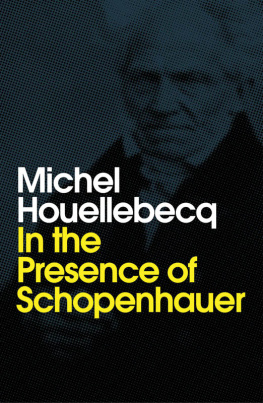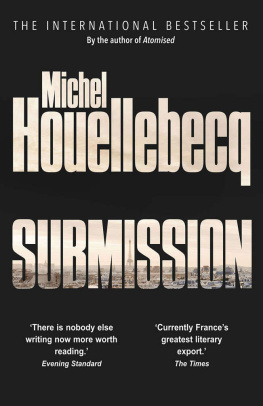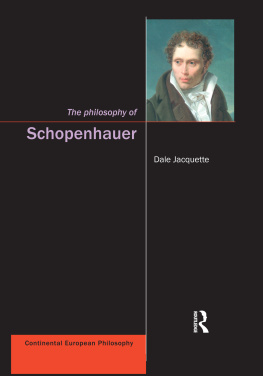
In the Presence of Schopenhauer
Michel Houellebecq
Preface by Agathe Novak-Lechevalier
Translated by Andrew Brown
polity
Copyright page
Originally published in French as En prsence de Schopenhauer Michel Houellebecq and Flammarion, Paris, 2016
This edition Polity Press, 2020
Preface by Agathe Novak-Lechevalier reprinted with permission of ditions de lHerne. Original title: Prface Agathe Novak-Lechevalier ditions de lHerne, 2017. All rights reserved.
Polity Press
65 Bridge Street
Cambridge CB2 1UR, UK
Polity Press
101 Station Landing
Suite 300
Medford, MA 02155, USA
All rights reserved. Except for the quotation of short passages for the purpose of criticism and review, no part of this publication may be reproduced, stored in a retrieval system or transmitted, in any form or by any means, electronic, mechanical, photocopying, recording or otherwise, without the prior permission of the publisher.
ISBN-13: 978-1-5095-4324-3
ISBN-13: 978-1-5095-4325-0
A catalogue record for this book is available from the British Library.
Library of Congress Cataloging-in-Publication Data
Names: Houellebecq, Michel, author. | Brown, Andrew (Literary translator), translator.
Title: In the presence of Schopenhauer / Michel Houellebecq ; preface by Agathe Novak-Lechevalier ; translated by Andrew Brown.
Other titles: En prsence de Schopenhauer. English
Description: Cambridge, UK ; Medford, MA, USA : Polity, 2020. | Summary: An ode to Schopenhauer by one of Frances most famous living authors-- Provided by publisher.
Identifiers: LCCN 2019055829 (print) | LCCN 2019055830 (ebook) | ISBN 9781509543243 (hardback) | ISBN 9781509543250 (paperback) | ISBN 9781509543267 (epub)
Subjects: LCSH: Schopenhauer, Arthur, 1788-1860--Influence. | Houellebecq, Michel--Philosophy.
Classification: LCC B3148 .H6313 2020 (print) | LCC B3148 (ebook) | DDC 193--dc23
LC record available at https://lccn.loc.gov/2019055829
LC ebook record available at https://lccn.loc.gov/2019055830
Typeset in 10.25 on 16.5 pt Plantin MT
by Fakenham Prepress Solutions, Fakenham, Norfolk NR21 8NL
Printed and bound in Great Britain by TJ International Limited
The publisher has used its best endeavours to ensure that the URLs for external websites referred to in this book are correct and active at the time of going to press. However, the publisher has no responsibility for the websites and can make no guarantee that a site will remain live or that the content is or will remain appropriate.
Every effort has been made to trace all copyright holders, but if any have been overlooked the publisher will be pleased to include any necessary credits in any subsequent reprint or edition.
For further information on Polity, visit our website: politybooks.com
Preface: The history of a revolution
When, in 2005, Michel Houellebecq began this translation of and commentary on Schopenhauers work an arduous and somewhat surprising enterprise for Houellebecq, and one which alone testifies to the strength of his admiration he had just finished writing The Possibility of an Island. The former, the philosophers main work, was also the work of a whole lifetime: the young Schopenhauer, who had just defended his thesis, worked intensely on it from 1814 to 1818, and a first version appeared in 1819; but he continued to add to it, and the work grew with successive editions until it became the imposing tome, often published in several volumes, which we know today. However, it was only with the publication of Parerga and Paralipomena (1851), where he brought together various essays (including the Aphorisms on the Wisdom of Life) setting out the essential points of his doctrine, that Schopenhauer finally very late in life found the public success he had always hoped for: The comedy of my celebrity begins, he is supposed to have said, what am I to do with it now that my hair is grey?
In the Presence of Schopenhauer, however, is not only a commentary: it is also the story of an encounter. At the age of around twenty-five or twenty-seven which sets the scene in the first half of the 1980s almost by chance, Houellebecq borrowed the Aphorisms on the Wisdom of Life from a library.
At the time, I already knew Baudelaire, Dostoevsky, Lautramont, Verlaine, almost all the Romantics; a lot of science fiction, too. I had read the Bible, Pascals Penses, Clifford D. Simaks City, Thomas Manns The Magic Mountain. I wrote poems; I already had the impression I was rereading, rather than really reading; I thought I had at least come to the end of one period in my discovery of literature. And then, in a few minutes, everything dramatically changed.
This was a decisive shock: the young man dashed across Paris, finally getting his hands on a copy of The World as Will and Representation which had quite suddenly become the most important book in the world; and as a result of this new reading, he says, everything dramatically changed.
An author, says Franois, the narrator of Submission, is above all a human being, present in his books, and even in these astonishing (to put it mildly) lines of verses from his first collection, La Poursuite du bonheur (The Pursuit of Happiness):
I want to think of you, Arthur Schopenhauer,
I love you and I see you in the reflection of the windows,
The world is a dead end and Im an old clown
Its cold. Its very cold. Earth, adieu.
This encounter was almost love at first sight, then but it also looks remarkably like a revolution. For Schopenhauers philosophy, which aims to develop a single thought
As Michel Onfray has decisively shown, it is, in fact, the whole of Houellebecqs work that could be read through the filter of Schopenhauers philosophy.
But the enterprise and herein lies its strength, and one of its major interests reveals that Houellebecq does not stick to this project: in his dense, sometimes difficult commentaries on the extracts he takes the trouble to translate himself, Schopenhauers work appears to him to be, not so much a lesson patiently and admirably assimilated, or even a model, as a formidable machine for thinking with. Little by little, the analysis emancipates itself from the letter of the text, and what we find is the outline of an investigation into the problems posed by splatter films and the representation of pornography in art, a criticism of the philosophies of the absurd, and, a little further on, a reflection on the emergence of urban poetry, the transformations of twentieth-century art, and the tragedy of banality which remains to be written. A wide-ranging set of ideas is reflected in this intensely personal exercise (everything here seems singularly Houellebecquian, including his note comparing the life of nomads that arises from need, to the life of tourists that arises from boredom); and this thought experiment seems already to be opening up other horizons. Thus, it is doubtless no coincidence that In the Presence of Schopenhauer precedes The Map and the Territory, which is perhaps, of all Houellebecqs novels, the most Schopenhauerian.
Love stories end badly, and Houellebecq claims to have moved away from Schopenhauer a decade or so after discovering him. Another encounter, with Auguste Comte, compelled him, he says, to become a positivist, with a kind of disappointed enthusiasm: Suspend the will, be aware of the gap, actively practise being out of sync: Schopenhauer, now and forever.
Agathe Novak-Lechevalier
Next page













